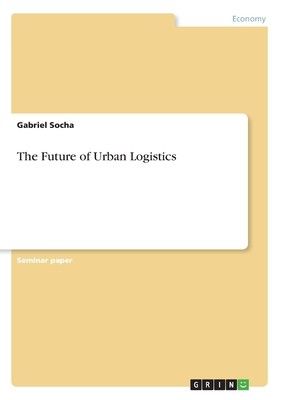
- We will send in 10–14 business days.
- Author: Gabriel Socha
- Publisher: GRIN Verlag
- Year: 2019
- Pages: 24
- ISBN-10: 3668940002
- ISBN-13: 9783668940000
- Format: 14.8 x 21 x 0.2 cm, softcover
- Language: English
- SAVE -10% with code: EXTRA
Reviews
Description
Seminar paper from the year 2019 in the subject Business economics - Supply, Production, Logistics, grade: 1,0, language: English, abstract: This paper deals with a selection of the most important future-oriented questions in the field of urban logistics. It analyzes the relevance of urban logistics, examines transportation types of the future and discusses the impact of demographic change and labor shortage on the logistics market. Further, the concept "Post 4.0" is critically questioned and it is reflected to what extent the fields procurement and production logistics are influenced by the global trends. Lastly, a conclusion summarizes the most important findings and introduces additional research fields. Urban logistics is a topic of increasing interest to both research and practice. Reasons for this are diverse: Population growth in urban areas is expected to continue, meaning that by 2030, 79% of the German population will live in these areas. This, in turn, has an impact on the already growing e-commerce which is a major driver for parcel delivery. As a result, parcel volume is expected to reach 5 billion pieces per year by 2026, equaling a growth of 100% since 2016. With a growing volume, not only the complexity of routes and business scalability increases, but also environmental problems, which are already the focus of various stakeholders anyway. Thus, logistics companies are required to develop innovative solutions, such as those derived from the possibilities of digitalization, in order to meet the increasing and changing demands of stakeholders.
EXTRA 10 % discount with code: EXTRA
The promotion ends in 18d.16:55:49
The discount code is valid when purchasing from 10 €. Discounts do not stack.
- Author: Gabriel Socha
- Publisher: GRIN Verlag
- Year: 2019
- Pages: 24
- ISBN-10: 3668940002
- ISBN-13: 9783668940000
- Format: 14.8 x 21 x 0.2 cm, softcover
- Language: English English
Seminar paper from the year 2019 in the subject Business economics - Supply, Production, Logistics, grade: 1,0, language: English, abstract: This paper deals with a selection of the most important future-oriented questions in the field of urban logistics. It analyzes the relevance of urban logistics, examines transportation types of the future and discusses the impact of demographic change and labor shortage on the logistics market. Further, the concept "Post 4.0" is critically questioned and it is reflected to what extent the fields procurement and production logistics are influenced by the global trends. Lastly, a conclusion summarizes the most important findings and introduces additional research fields. Urban logistics is a topic of increasing interest to both research and practice. Reasons for this are diverse: Population growth in urban areas is expected to continue, meaning that by 2030, 79% of the German population will live in these areas. This, in turn, has an impact on the already growing e-commerce which is a major driver for parcel delivery. As a result, parcel volume is expected to reach 5 billion pieces per year by 2026, equaling a growth of 100% since 2016. With a growing volume, not only the complexity of routes and business scalability increases, but also environmental problems, which are already the focus of various stakeholders anyway. Thus, logistics companies are required to develop innovative solutions, such as those derived from the possibilities of digitalization, in order to meet the increasing and changing demands of stakeholders.


Reviews